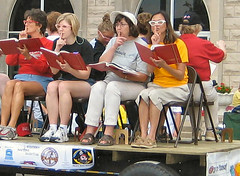This is hardly the first financial crisis the world has faced. What kinds of books were coming out fifty or even a hundred years ago to help people get a grasp on economic concepts during times of uncertainty?
There are thousands of titles, and you can find the names of many at The Wall Street Curmudgeon. The site has listed over 400 books about the U.S. market. Some of my favorite titles range from the alliterative (Fads, Fakes, Freaks, Frauds and Fools, published: 1923) to the ingenious (Where are the Customers’ Yachts?, published: 1940).
A few other gems from the list:
My Adventures with Your Money (Author: George Graham Rice, 1911)
My Stockbroker is a Bum (Author: Anonymous. Published: 1971)
Laugh With Your Investments (Author: Regina Barnes. Published: 1960)
Little Bits About Big Men (Author: B.C. Forbes. Published: 1941)
Today, the Pulitzer Prizes were announced, honoring the best journalism and writing of the year. Among them was biography winner T.J. Stiles, who wrote The First Tycoon: The Epic Life of Cornelius Vanderbilt. NewsHour’s ArtBeat blog spoke with Stiles after he won the National Book Award in November.
A few weeks ago, we looked at the best books that have come out on finance during the recent crisis. NewsHour’s Paul Solman had some big-time economists suggest their favorites.
Have you read anything worthwhile about the markets lately? Or have ideas of a title that’s not yet been written? Suggest names of books (real or imagined!) below.
